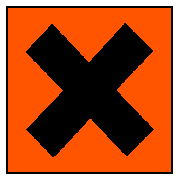International Chemical Safety Cards
| PROPANIL | ICSC: 0552 |
PROPANIL |
 |
| TYPES OF HAZARD/ EXPOSURE |
ACUTE HAZARDS/ SYMPTOMS |
PREVENTION | FIRST AID/ FIRE FIGHTING |
| FIRE | Not combustible. Liquid
formulations containing organic solvents may be flammable. Gives off irritating or toxic
fumes (or gases) in a fire. |
|
In case of fire in the
surroundings: all extinguishing agents allowed. |
| EXPLOSION | |
|
|
| EXPOSURE | |
PREVENT DISPERSION OF DUST!
AVOID EXPOSURE OF ADOLESCENTS AND CHILDREN! |
|
| INHALATION | Blue lips or finger nails. Blue
skin. Headache. Dizziness. |
Avoid inhalation of fine dust
and mist. Local exhaust or breathing protection. |
Fresh air, rest. Refer for
medical attention. |
| SKIN | Rash. |
Protective gloves. Protective
clothing. |
Remove contaminated clothes.
Rinse and then wash skin with water and soap. |
| EYES | |
Safety goggles. |
First rinse with plenty of water
for several minutes (remove contact lenses if easily possible), then take to a doctor. |
| INGESTION | Burning sensation. Confusion.
Drowsiness. Nausea. Vomiting (further see Inhalation). |
Do not eat, drink, or smoke
during work. Wash hands before eating. |
Rinse mouth. Induce vomiting
(ONLY IN CONSCIOUS PERSONS!). Refer for medical attention. |
| SPILLAGE DISPOSAL | STORAGE | PACKAGING & LABELLING | ||
| Do NOT wash away into sewer.
Sweep spilled substance into sealable containers; if appropriate, moisten first to prevent
dusting. Carefully collect remainder, then remove to safe place (extra personal
protection: A/P2 filter respirator for organic vapour and harmful dust). |
Provision to contain effluent
from fire extinguishing. Separated from food and feedstuffs. |
Do not transport with food and
feedstuffs. Xn symbol R: 22 S: (2-)22 |
||
| SEE IMPORTANT INFORMATION ON BACK | ||||
|
||||